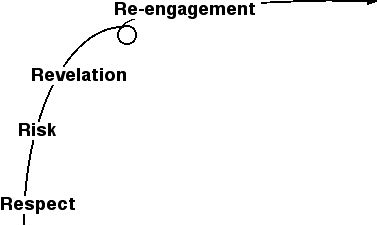- Synthesis of PlusDeltas from Day 1 and of Six Principles or Questions
Preamble
The workshop as a whole aims:- 1. to formulate new approaches to health intervention research, and
- 2. to do so in a way that maximizes the investment of the participants in further development and implementation of those approaches.
- A. Workshop participants will be introduced to tools and processes for individual reflection and group interaction designed to produce the insights and to deepen the people-connections valuable for seeing new paths and generating new opportunities. The hope is that the tools and processes and the connections will carry over to the time after the workshop and help in the further development of #1 and continuation of #2.
- B. To contribute not only to #1 and #2, but also to the carry-over from the session afterwards, the session is informed by the sequence of “4Rs”: a well-facilitated collaborative process keeps us listening actively to each other (and to ourselves), fostering mutual Respect that allows Risks to be taken, elicits more insights than any one person came in with (Revelation), and engages us in carrying out and carrying on the plans each of us develops (Re-engagement).

(* This framing is somewhat different from the emphasis on individual creativity put forward in Roberta Ness's 2012 valuable article, "Tools for Innovative Thinking in Epidemiology," American Journal of Epidemiology 175(8): 733-738, and the book that expands on the article.)
The session facilitator, Peter Taylor, directs the graduate programs in Critical and Creative Thinking (http://www.cct.umb.edu) and Science in a Changing World (http://www.cct.umb.edu/sicw) at the University of Massachusetts Boston and teaches a doctoral course on epidemiological thinking for non-specialists (http://ppol753.wikispaces.umb.edu). He will be assisted by Julian Little and Nancy Kreiger, who co-led a discussion on innovation in epidemiological research at ACE 2011, hosted a workshop by Peter at her workplace in 2011 and at ACE in 2012, and co-prepared a report published in the ACE newsletter last summer. A blog set up to continue conversations after ACE12, http://epidemiologyinnovate.wordpress.com/about, has not yet taken off, but welcomes contributors.
A source for the tools and processes is Taylor, P. and J. Szteiter (2012) Taking Yourself Seriously: Processes of Research and Engagement. Arlington: The Pumping Station (online as paperback or pdf from http://thepumpingstation.org/books or as paperback or hardcover from regular online booksellers).
Program
0. Plus-Delta feedback throughout the day, submitted via smartphone or laptop at http://bit.ly/PlusDelta, and viewable at http://bit.ly/PDResponses.- Feedback that begins with an appreciation (plus) before suggesting what could be developed further (delta) makes the suggestions more likely to be heard and taken up. So that this feedback can be done quickly and often, only one plus and one delta is required; the composite of the participants' responses will probably cover other points you might have made in a longer evaluation.
a. Dialogue Hour on how this morning's papers stimulated or intersected with our thinking about intervention research (in 3 breakout groups of 10; 60 minutes)
- This process centers around listening—to yourself as well as others. Shared and personal meaning emerges within a group through listening to what is said from a standpoint of inquiry and reflection more than advocacy of positions. As a warm-up, the dialogue begins with 5 minutes guided freewritingso that thoughts about the issues can surface.
- In a Freewriting exercise, you should not take your pen off the paper. Keep writing even if you find yourself stating over and over again, “I don't know what to say.” What you write will not be seen by anyone else, so do not go back to tidy up sentences, grammar, or spelling. You will probably diverge from the topic, at least for a time, while you acknowledge other preoccupations. That is OK—indeed, it is another purpose of the exercise. However, if you keep writing for five minutes, you should expose some thoughts about the topic that had been below the surface of your attention.
back in the main room
b. Believing and doubting (30 minutes)
- In order to stimulate the out-of-the-box side of our brains, a set of short think-pieces about epidemiology or health interventions are available to read and comment on. Many of these think-pieces are unconventional or in need of elaboration, so they should not be seen as specific proposals for the research agenda that the workshop wants to end up developing. See this exercise primarily as reminding us how we can move out of comfortable familiar areas.
- Using carbon paper (so you can keep a copy), comment first from a position of "Believing: 'Try to believe everything I have written, even if you disagree or find it crazy. At least pretend to believe it. Be my friend and ally and give me more evidence, arguments, and ideas to help we make my case better', then from "Doubting: 'Try to doubt everything I have written, even if you love it. Take on the role of enemy and find all the arguments that can be made against me.'" (from Peter Elbow) Submit the originals so they can be scanned and made available to all (subject to the legibility of your handwriting).
c. Six principles and questions (20 minutes), prepared on paper or laptop, then submitted via smartphone or laptop at http://bit.ly/SixPQs, and viewable at http://bit.ly/SixPQShare.
- As you see things at this point in the workshop, formulate six principles or questions that should be addressed by any initiative in population-based intervention research. (You might imagine that you are contributing to the first draft of an RFP.)
d. Plus-Delta on this 2-hour session, submitted via smartphone or laptop at http://bit.ly/PlusDelta, and viewable at http://bit.ly/PDResponses.
